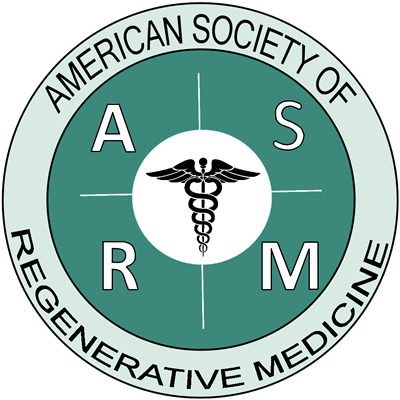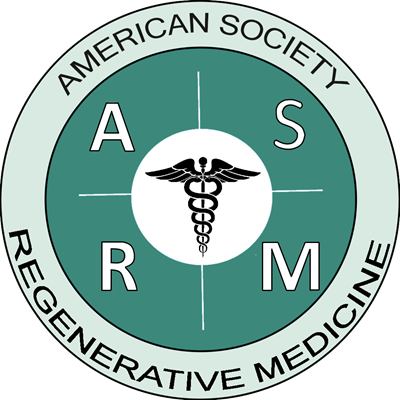ASRM Code of Ethics in Regenerative Medicine
(2024)
Preamble
The ASRM Code of Ethics in Regenerative Medicine applies to physicians (allopathic, osteopathic) engaged in the practice of Regenerative Medicine. As an emerging medical specialty, these Regenerative Medicine ethics standards are built on the foundation of existing standards of conventional medical and surgical specialties. The AARM Code of Ethics is meant to provide the foundation for Ethics in Regenerative Medicine.
I. The Physician-Patient Relationship
I.A.
A Regenerative Medicine physician must recognize that the physician-patient relationship is the primary focus of ethical considerations in Regenerative Medicine.
I.B.
A Regenerative Medicine physician-patient relationship must be based on honesty and trust.
I.C.
A Regenerative Medicine physician is obligated to only treat conditions for which he or she is trained and competent to deliver appropriate patient care.
I.D.
A Regenerative Medicine physician shall not decline or accept patients solely onthe basis of race, gender, sexual orientation, religion, national origin, disability, ability to provide payment, or any other form of discrimination.
I.E.
When obtaining informed consent for treatment, a Regenerative Medicine physician is obligated to identify the present pertinent medical facts and information in understandable terms consistent with medical standard of care practices. Such information should include at a minimum: objectives of treatment, potential benefits, risks and complications, and alternative treatments.
II. Professional Conduct
II.A.
A Regenerative Medicine physician is expected to provide competent and compassionate care, while maintaining the patient’s best interests.
II.B.
A Regenerative Medicine physician is expected to conduct himself or herself at thehighest moral and ethical level, while complying with all relevant federal, state and local laws.
II.C.
A Regenerative Medicine physician shall cooperate with applicable peer review processes as well as other authorities in professional (institutions, state medical boards, etc.) and legal matters.
III. Professional Competence
III.A.
A Regenerative Medicine physician must obtain competence in the specialty through formal education in Regenerative Medicine.
III.B.
A Regenerative Medicine physician must continually strive to maintain and improve their knowledge in the field through attendance at formal medical educational and academic activities.
III.C.
A Regenerative Medicine physician shall first be residency trained and board eligible/certified in a primary medical or surgical specialty.
III.D.
A Regenerative Medicine physician should strive to obtain advanced academic training and board certification in Regenerative Medicine.
III.E.
A Regenerative Medicine physician must monitor the quality of care they deliver asindividual practitioners through review of one’s own records, peer review, and useof other quality improvement tools.
III.F.
A Regenerative Medicine physician must maintain the commitment to develop and implement appropriate quality and performance improvement measures in their daily practice.
III.G.
A Regenerative Medicine physician shall not practice outside of the scope of their competency based on primary and/or advanced medical specialty training and certification.
IV. General Principles
IV.A.
A Regenerative Medicine physician must contribute to the development of the specialty through clinical practice, research, teaching, or advocacy on behalf of the profession.
IV.B.
A Regenerative Medicine physician shall stay current with best practices in Regenerative Medicine based on evidence-based medicine.
IV.C.
A Regenerative Medicine physician shall only practice within the scope of his or her education, training, and experience in their primary or advanced specialty.
IV.D.
A Regenerative Medicine physician shall not provide a service where the responsibility for diagnosis, care, and decision making is delegated to another health care provider.
IV.E.
A Regenerative Medicine physician’s treatment claims must be based on peer reviewed scientific evidence.
IV.F.
A Regenerative Medicine physician must recognize that the resolution of potential conflicts of interest in the practice of Regenerative Medicine must always beresolved with the best interest of the patient in mind.
IV.G.
A Regenerative Medicine physician shall maintain appropriate professional relationships with colleagues and the remainder of the healthcare team.
IV.H.
A Regenerative Medicine physician shall not represent themselves, their practice, or their medical care interventions in an untruthful, misleading or deceptive manner.
IV.I.
A Regenerative Medicine physician shall only seek reasonable and appropriate compensation for medical services performed.
IV.J.
A Regenerative Medicine physician is encouraged to dedicate time and care to patients irrespective of their ability to provide payment.
IV.K.
A Regenerative Medicine physician’s financial interest in or royalties from medicalproducts or procedures, facilities or any other aspect related to a patient’s care should be disclosed to a patient concordant with applicable state and federal laws.
V. reGENERATIVE mEDICINE TREATMENTS
V.A.
The use of Regenerative Medicine products such as Stem Cells without a scientifically proven safety profile including Phase 1 and Phase 2 Clinical Trial safety data is considered unethical.
V.B.
The use of Xenogenic products (animal derived) for human use is considered unethical.
V.C.
The use of Gene Editing and Gene Therapy products not yet approved by U.S. FDA is considered unethical.
V.D.
The treatment of cancer with Regenerative Medicine immunotherapy products not yet approved by U.S. FDA is considered unethical.
Vi. Research and Academic Responsibilities
VI.A.
A Regenerative Medicine physician’s research and academic activities must beconducted under conditions of full compliance with ethical, institutional, and governmental guidelines.
VI.B.
A Regenerative Medicine physician must inform the potential research subject about the purpose of the study, funding source, potential for harm and benefits, the nature of the physician’s participation and potential financial interest, and all other disclosures required under state and federal law.
VI.C.
Research subjects participating in research programs must have given full informed consent and retains the right to withdraw from the research protocol at any time.
Become a Member
Join the AABRM today! As a member you have access to experts in the field, publications, research opportunities and Board Certification
Member Application
